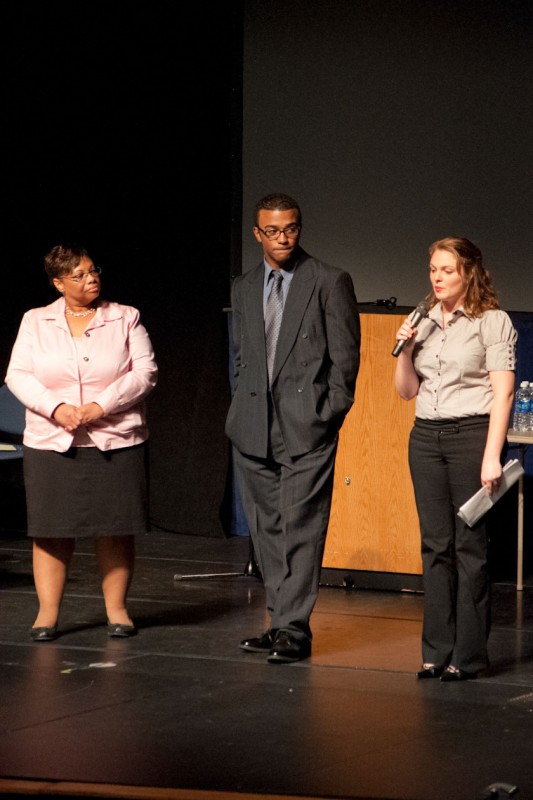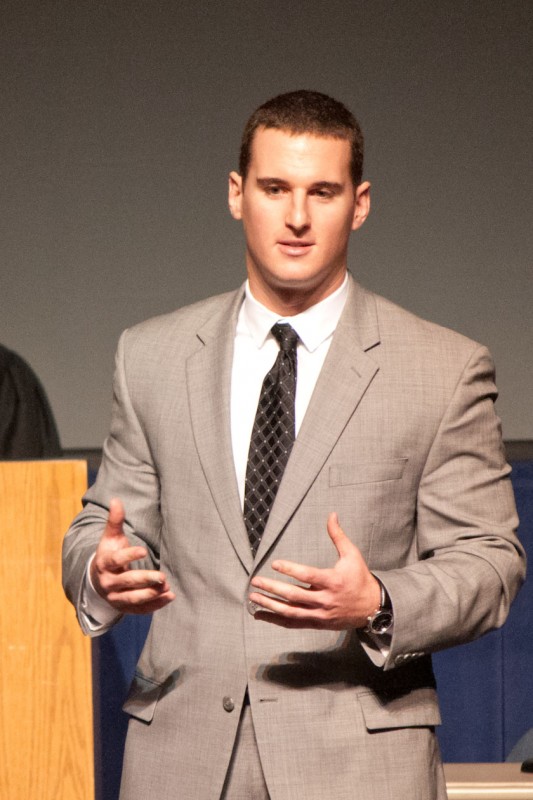
Photo by Sean Patterson
Laughter is not something you generally expect to hear in a courtroom, even a fake courtroom, especially when the issue at hand is as serious as sexual assault. But there was plenty of good-natured laughter onstage and in the audience during the Mock Rape Trial Wednesday night.
Much of the laughter came from the small mess ups of the participants who were acting out the roles, and the purposefully overblown questions of the defense attorneys.
The overall message, however, was clear: sexual assault and its prosecution are no laughing matters.
The UNF Women’s Center and the Department of Criminology and Criminal Justice hosted the event, which took place at 7 p.m. in the Andrew Robinson Theater. It included several criminal justice professionals from the Jacksonville area as well as a few students, portraying a realistic, though shortened, version of a sexual assault trial.
Sheila Spivey, director of the UNF Women’s Center, said the center has done mock trials before on similar issues, though not for a few years due to limited resources. She said interactive events are great tools for educating the campus community about tough issues.
“This is an issue that is difficult for people to talk about and we want to encourage dialogue, healthy dialogue, around the issue of sexual violence,” Spivey said.
Spivey said it was easy to recruit the professional participants since she had several connections. She contacted Terence Martin, the division chief of the special assault division for the 4th judicial circuit, who agreed to participate and recruit others.
Aaron Feuer, an assistant state attorney who played the role of defense in the trial along with Martin, said he thought it would be fun and was

photo by Sean Patterson
a good opportunity to show students what trial is like. He said he and Martin tried to provide a little entertainment in their presentation to keep things interesting for the audience.
While professionals were willing to be involved, recruiting students proved more difficult. The Women’s Center put out an open casting call, but few students showed up, especially male students.
Spivey said she thought this was due to the concern about a perceived stigma that could be attached to students through being part of the trial.
“It takes a lot of courage to get onstage in front of your peers and play the role of an offender,” she said.
But Raymond Jack, an English junior, stepped forward to play the role. Before the event, Jack explained to the audience that he thought it was important to educate both men and women on issues such as sexual assault.
They are called women’s issues, he said, but men have a lot to do with preventing these issues.
Some of the students didn’t know they would be participating until they got to the event. After a brief introduction, the moderator told attendees to look at the back of their programs. The 12 students with a sticker on their program were called onstage to act as the jury.
Rima Zakaria, an education junior, was one of the jury members. She said she experienced a bit of stage fright when she went onstage, but learned a lot about the criminal justice system through the experience.
The case was not clear cut. Both the attorneys and the witnesses made a substantive case for either side. Indeed, the audience was divided when the moderator asked for a vote.
While the jury was making a decision, the moderator showed the audience a video depicting the event in question, which clearly showed it to be a case of rape. Obviously, such videos do not exist in actual cases, and it was a testament to just how difficult it can be to prosecute sexual assault.
Amal Kamal, a communication and international studies major who attended the event, said she thought the defendant was innocent before seeing the video. She said there was enough reasonable doubt in the case that she thought he shouldn’t be convicted.
The jury was apparently not so divided, and ultimately decided to convict the defendant.
Email Dargan Thompson at features@unfspinnaker.com







